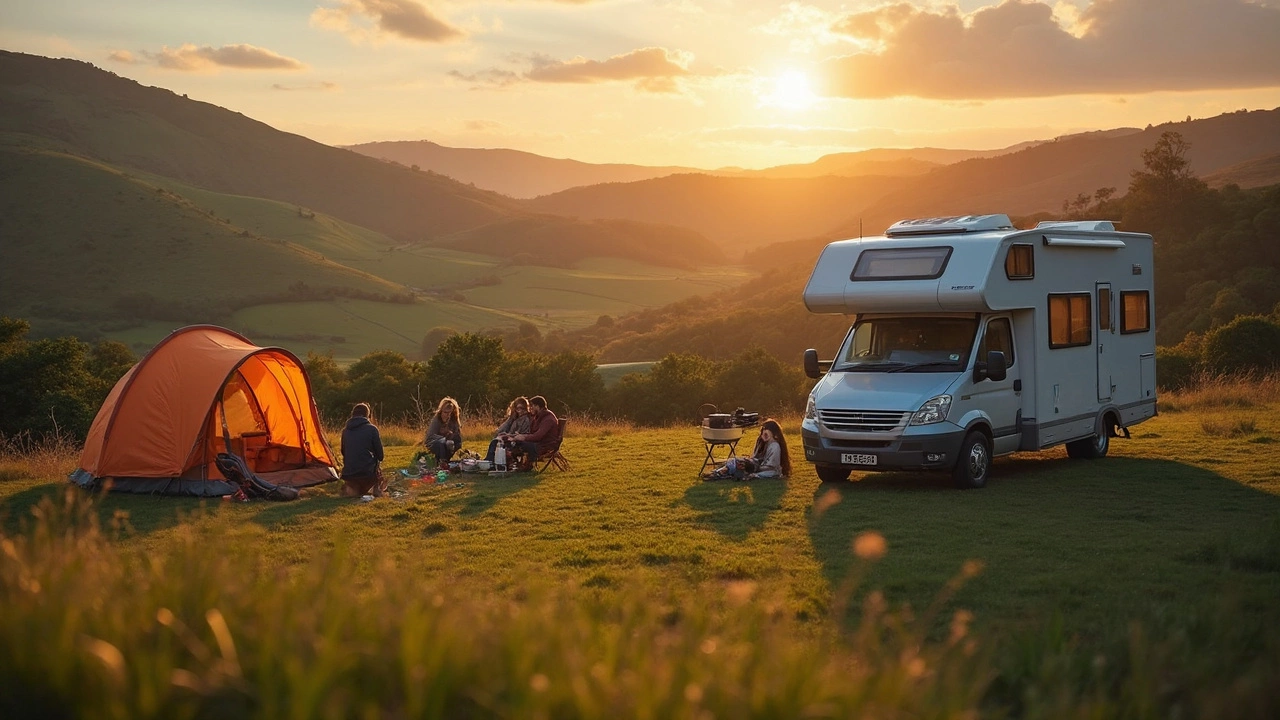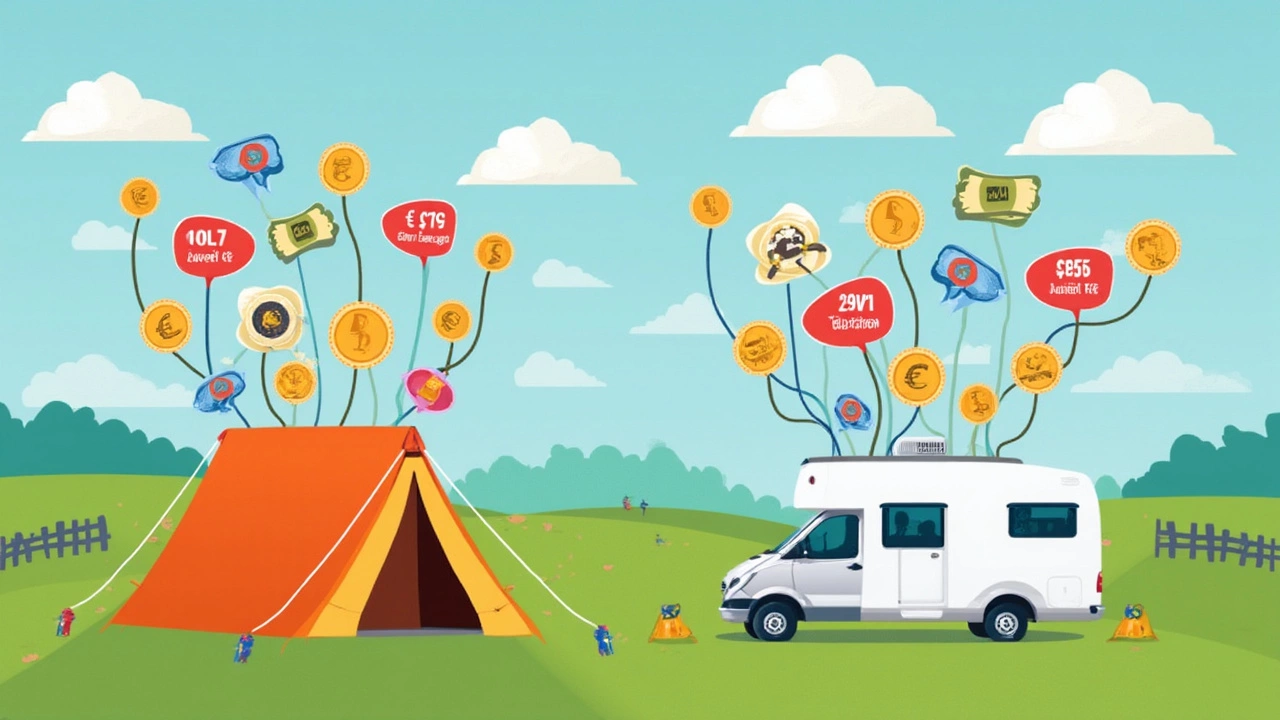Is Tent Camping Cheaper than RV? Here's What You Need to Know
 Apr, 4 2025
Apr, 4 2025
When it comes to camping with the family, cost often becomes a key factor in deciding between a tent and an RV. So, is tent camping actually cheaper than taking the RV out for a spin? Well, it's not as straightforward as you might think. Let's dive into some numbers and practical tips that can help you figure this out.
First off, let's talk about initial costs. A decent tent can set you back anywhere from $100 to $300, and you'll need some essentials like sleeping bags and camp cookware. On the flip side, RVs are a more significant investment, often ranging from $10,000 to several hundred thousand. So, yeah, the upfront cost of tent camping is generally a fraction of that of an RV.
However, once you hit the road, things can get a little tricky. Campsite fees for tents are usually cheaper—often around $20 to $30 per night—compared to RV sites where you might be looking at $30 to $60. But RVs offer comforts like a bed, a kitchen, and even a bathroom, cutting down on expenses for dining out or public showers.
Maintenance is another aspect to consider. While tents don't require much more than a clean and dry storage spot, RVs need regular upkeep, including oil changes, tire care, and maybe even storage fees when not in use. Plus, you'll have to think about gas, which, let's face it, doesn't come cheap.
- Initial Costs: Tent vs. RV
- Campsite Fees and Hidden Costs
- Maintenance and Operational Expenses
- Tips for Budget-Friendly Camping
Initial Costs: Tent vs. RV
When you're figuring out the best way for your family to hit the great outdoors, one of the first things to consider is the initial costs of tent camping versus RV camping. These up-front expenses set the tone for how much you'll spend before you even leave the driveway.
Tents are pretty budget-friendly. A solid three-person camping tent might run you anywhere from $100 to $300, depending on brand and features. Add in sleeping bags, which cost around $30 to $100 each, and basic camping gear like a portable stove and cookware, and you're still looking at less than $500 to get all the essentials.
RVs, on the other hand, can be a whole different ballgame. Prices start around $10,000 for a used pop-up camper and soar upwards of hundreds of thousands for a deluxe motorhome. There's often a sweet spot for family camping around the $30,000 to $50,000 range if you’re buying new. And let's not forget about insurance, which for RVs can range from $200 to $1,500 annually.
But those aren’t the only numbers to think about. There's also registration fees, usually a couple of hundred bucks, and the potential need for a special towing vehicle if your RV is a trailer. With those added costs, an RV camping adventure becomes a significant initial investment, much more so than pulling your minivan into a store parking lot for a tent run.
Here's a quick look at a basic breakdown of initial costs:
| Item | Tent Camping | RV Camping |
|---|---|---|
| Tent | $100 - $300 | - |
| Sleeping Bags | $60 - $200 | - |
| Cookware/Stove | $100 | - |
| Basic RV | - | $10,000 - $300,000+ |
| Insurance | - | $200 - $1,500/year |
| Registration | - | $100 - $200/year |
So, if you're all about keeping up-front costs low, a tent is your go-to option. But for those who value comfort over cost, the significant investment in an RV might just be the ticket to a cozy, home-on-wheels experience.
Campsite Fees and Hidden Costs
When planning a camping trip, understanding campsite fees and hidden costs can be a real game-changer, especially when deciding between tent camping and using an RV. Sure, it might seem straightforward at first—tents are cheap, RVs are pricey—but there's more to it.
Let's start with the basic fees: most campsites charge less for a tent spot, typically around $20 to $30 per night. If you're hauling an RV, prepare to dish out more. Rates for RV sites can range from $30 to $60 per night, especially if you want hookups for water, sewage, and electricity.
But hold on, what about those sneaky hidden costs? Besides the obvious ones like nightly fees, you might encounter charges for extra amenities. Some campgrounds offer Wi-Fi, firewood, or even shower facilities at an additional cost. While these can be small, they can add up over a longer stay. Also, state and national parks often charge admission fees or require a pass, so factor that into your budget.
An interesting stat to chew on: according to a 2023 survey of frequent campers, 60% found that their campsite costs were higher than expected due to hidden fees. This just goes to show how being aware of potential extra costs can save you a headache down the line.
Oh, and don't forget about seasonality! Campsite fees can fluctuate based on peak seasons. Summertime? Be ready for higher prices and more competition for spots. Booking in advance can save you from last-minute hikes in fees or running out of spaces altogether.
In a nutshell, while tent camping might seem like the cheaper option upfront, understanding campsite fees and potential hidden costs ensures that you won't get caught off guard. And no matter your choice, a little planning goes a long way in making sure your family camping trip is as enjoyable and budget-friendly as it can be.

Maintenance and Operational Expenses
When it comes to keeping your camping gear in tip-top shape, there's a world of difference between tent camping and going the RV camping route. Let's break it down.
Tents are quite the low-maintenance option. Just keep them clean, dry, and properly stored to ensure they last several seasons. No oil changes or tire rotations needed here! Maybe a new set of stakes or a patch kit every once in a while, but that's about it.
Now, RVs, they’re like your home on wheels—except homes don't have engine troubles. RV maintenance is ongoing and can add up faster than you'd think. We're talking oil changes, brake inspections, tire replacements, and winterizing tasks if you live in a colder climate. And let's not forget fueling it up! With RVs averaging around 6 to 12 miles per gallon, trips to the pump can quickly swell the budget.
Here's a peek at some typical maintenance costs for RVs:
| Maintenance Task | Estimated Cost |
|---|---|
| Oil Change | $100 - $200 |
| Tire Replacement | $250 - $600 per tire |
| Winterizing | $100 - $200 |
| Routine Inspection | $100 - $300 |
Operational costs also include campsite fees. RV parks can charge additional fees for electricity, water, and sewage hookups that can range from $10 to $30 per night. Add it all up, and you might start wondering if your RV is more of a hotel on wheels than a cost-saving camping option.
This isn't to say RVing isn't worth it! It's just important to know what you’re signing up for financially. If you crave comfort and the cozy feeling of a mobile home, budgeting for these additional expenses can make all the difference in keeping your travels hassle-free.
Tips for Budget-Friendly Camping
Thinking of ways to pinch pennies while enjoying the great outdoors? There are some cool tricks to make both tent camping and RV camping more affordable for your family. Here are some practical tips that'll keep your costs down.
One of the easiest ways to save money is by booking campsites well in advance. Many sites offer early-bird discounts, and you’ll have more options to choose a cheaper spot. And remember, national parks often have cheaper rates compared to private campgrounds, so keep them in mind!
When it comes to gear, borrowing or renting can be huge budget savers. Instead of purchasing new gear, ask friends or check local outdoor shops for rental options. This especially makes sense for items you'll use infrequently, like a kayak or an extra tent.
For food, consider doing your own meal prep instead of relying on expensive campsite stores or nearby restaurants. Think one-pot meals or barbecuing to keep things simple yet filling.
Another nifty tip is to take advantage of FREE activities around the campsite. Hiking, fishing, and stargazing are just a few adventures that cost nothing but are lots of fun. You'll also likely discover some unique local sights with a quick chat at the information kiosk.
Here's a little nugget: check if your RV has a membership club. Many RV parks offer discounts for members, which can add up to significant savings over time.
Cost-Saving Activities:
- Observe and photograph wildlife
- Attend free ranger programs
- Explore local trails
Lastly, ensure you're running your RV efficiently. Keeping up with regular maintenance can prevent costly repairs down the road. Simple things like checking tire pressures and ensuring seals are tight to avoid leaks can save money on fuel and could save on repair costs.
By planning ahead and being a little resourceful, camping with your family can be an enjoyable and budget-friendly experience. Whether you're in a tent or an RV, the thrill of the open road and the beauty of nature won’t break the bank when you follow these handy tips!